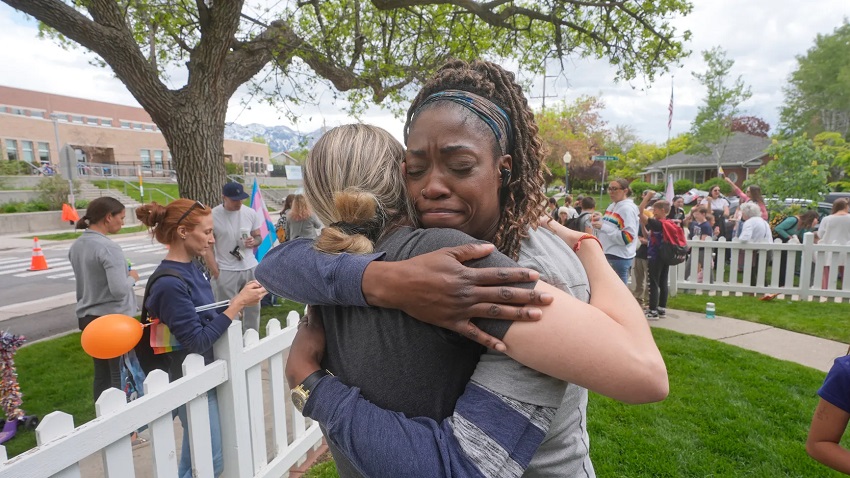Ogden, Utah — In a controversial move, the Utah State Legislature has passed a bill that will prohibit transgender students from living in dorms that correspond with their gender identity. The measure, which passed both chambers with veto-proof majorities, is set to head to the desk of Republican Governor Spencer Cox, who has previously expressed support for such restrictions.
Under the newly passed bill, transgender students at Utah’s public colleges and universities will only be allowed to reside in gendered spaces such as dormitories, locker rooms, and bathrooms that align with their sex assigned at birth. However, transgender students will be permitted to live in single rooms within coed dorms. The bill, which applies to public university housing, extends beyond previous laws that restrict transgender individuals’ access to bathrooms and changing facilities in K-12 schools and some government buildings in Utah and other states.
The legislation has sparked heated debate, with advocates for transgender rights arguing that it further marginalizes an already vulnerable community. One of the most vocal critics, Rep. Sahara Hayes, Utah’s only openly LGBTQ+ lawmaker, expressed frustration on the House floor, saying, “The LGBTQ community is so tired… We are so tired of being scared every year when this body meets because we don’t know how we’re going to be targeted. It’s starting to feel inevitable.” Hayes condemned the bill as part of a larger pattern of legislation targeting the state’s small transgender population, which has already seen bans on gender-affirming care for transgender youth and participation in girls’ sports for transgender girls.
The bill’s sponsor, Rep. Stephanie Gricius, of Eagle Mountain, defended the legislation, asserting that it was necessary to protect the privacy of female students. Gricius argued that the law would allow for a more comfortable living arrangement for women who might feel uncomfortable sharing dorms or facilities with transgender women.
The legislation was brought to the forefront of public discourse after a social media post from a mother of a student at Utah State University went viral. The mother criticized the university for not informing her daughter that she would be assigned a transgender suitemate. The post sparked a wave of criticism, leading to heightened attention on transgender students’ rights in campus housing.
One of the individuals directly impacted by the issue is Marcie Robertson, a transgender woman who was assigned to be a resident assistant in a women’s dorm at Utah State University. Robertson said she has faced harassment and death threats since the controversy began, describing the situation as “excruciating.” During a committee hearing, Robertson spoke of the personal toll the attention and legislation have had on her, particularly as the law targets her and other transgender individuals.
On the Senate floor, some lawmakers voiced strong support for the bill. Sen. David Hinkins, a Republican from Ferron, shared his own experience of being removed from housing at Brigham Young University for violating university rules. He suggested that individuals who do not conform to the social expectations of a given space should simply find alternative housing arrangements. His remarks, widely interpreted as a comment on the transgender individuals affected by the bill, further ignited tensions.
Despite the strong backing from many Republican lawmakers, the bill was not without its detractors. Sen. Daniel Thatcher, a Republican from West Valley City, stood alone in opposition to the measure, criticizing his colleagues for repeatedly passing legislation that harms a vulnerable minority. He warned that the bill would likely result in more lawsuits targeting the state over its treatment of transgender individuals.
Governor Spencer Cox now faces a decision on whether to sign the bill into law. While his office has stated that he will “closely examine” the legislation, the governor’s history of supporting similar restrictions suggests that he may approve the measure, which passed with a veto-proof majority in both legislative chambers.
The bill reflects a broader national trend, with 12 states currently enacting bathroom laws that restrict transgender individuals’ access to gendered facilities. In Utah, as in other states, the debate over the rights of transgender individuals continues to be a contentious issue. As the state prepares to potentially become the first to impose such restrictions on university housing, the future of transgender rights in Utah remains uncertain.
The measure’s passage highlights a growing divide over how to balance privacy concerns and the rights of transgender individuals. As debates over these issues intensify across the country, Utah’s new law is likely to become another flashpoint in the ongoing struggle over transgender rights.

